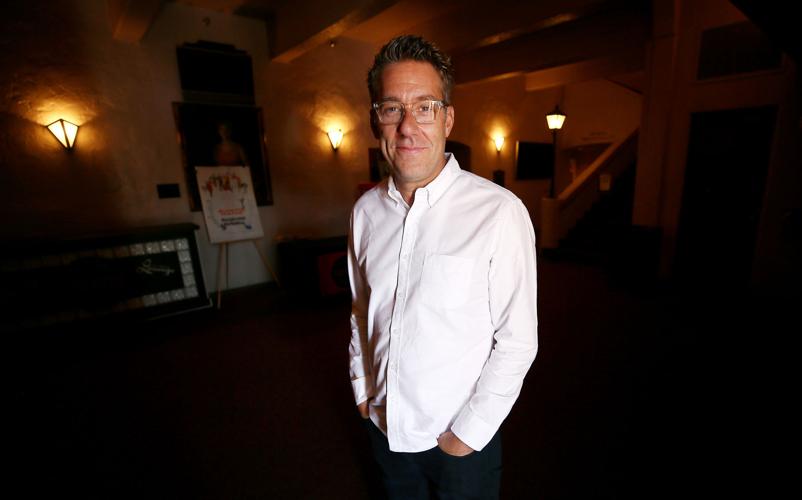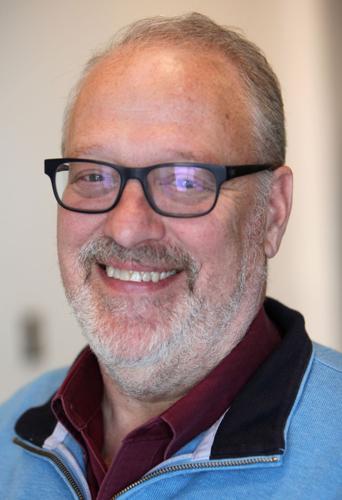David Ivers is pumped.
Arizona Theatre Company’s new artistic director officially stepped into the role July 1, and he is full of enthusiasm and ideas.
David Ira Goldstein, who held the position for 25 years, retired at the end of June — something he had been trying to do for four years.
Goldstein’s retirement was delayed due to ATC’s financial struggles over the past several years. It nearly folded last year before an emergency fundraising campaign brought in the $2 million it needed to stay afloat.
Ivers knew about the struggles, and they did not deter him — though he put a caveat on his acceptance of the job.
Ivers is tall and lanky and practically vibrates with energy. He laughs easily and looks directly at you when speaking. He sat down in the Temple of Music and Art theater to talk to the Star about everything from his love of Arizona, to why he took the job, to the direction in which he plans to take ATC, which has full seasons in both Tucson and Phoenix.
An affinity for Arizona: “The first sleep-away camp I went to when I was a kid was outside Prescott. My wife and I … honeymooned in Sedona and Flagstaff so we could hike and eat great food. That kind of took our breath away. My family is in Canada, and for the last four holidays (save one), we decided to meet in Arizona. ... So when this job became available and people started whispering ‘are you interested’ … I said I was willing to have a conversation.”
The pull of ATC: “I knew about the (financial) troubles ... but I learned over the process of the first interview — which was in a conference room at Sky Harbor Airport in December — that this place is ripe with potential. The production values are already there; David (Ira Goldstein) has done some really, really smart things. For me, it’s a community and a theater that just needs some re-engagement with itself, with where it lives in both cities. I would never label myself a visionary, but I would probably suggest that I’m an institution builder. ... So (the ATC job) gradually became, ‘Oh this is sounding more and more attractive.’ ”
The deal: “When I became the unanimous candidate — the board’s words, not mine — I felt I had the opportunity ... to say ‘I would like to fight on behalf of the staff before I take this job. So if you are serious about me doing this, we have to raise some money before we start. I won’t take the job unless we start to equalize cash flow problems. I’ll help, and I’ll do that even as a candidate, but I can’t in good conscience ask myself and my family to move here, or these families who live here, to continue if you aren’t serious about saving the theater.’” About $500,000 was raised. That, combined with the successful season that just ended, put ATC on solid financial footing as it goes into the next season. Ivers accepted the job.
Building a season: “I am in the process of identifying a staff-driven and a community-driven season selection committee. They will probably start in September and will meet twice a month through January. We’ll read plays, we’ll discuss them, production will be involved, development will be involved. ... They will have a voice, have a responsibility to bring scripts to the table, but the ultimate decision rests with me in consultation with the managing director (Billy Russo).” Goldstein selected the 2017-18 season as an artistic director had not yet been hired. The first season that will reflect Ivers’ vision is 2018-19.
The plays: “The notion of community, the notion of inclusivity, will always have a presence in the seasons I select. ... How do we serve the community, how is the community involved in the stories we tell on stage, and how will we look toward inclusivity in terms of parity, diversity, and toward voices we may not have heard from? … I have to be conscientious of titles that drive people to the theater, but I would also like to put on our regional theater big-boy pants and do some work that is a little bolder, thematically, and entertains but gives us an opportunity for community discourse. ... The most important thing is that what is on that stage is full of virtuosity and excellence — that will always drive the vision of the theater.”
Arizona artists: A complaint that has followed ATC is the lack of local talent on stage. One of the obstacles is that actors have to be available on a full-time basis; many Arizona artists have jobs outside the theater. “My intention is to open the floodgates and say ‘you are welcome here.’ There is a baseline bar of excellence that this theater has. If you are at that ability and level, and you can make it work to work here, you will.’”
Diversification of staff, artists, playwrights: “In (the 2018-19 season), that is a priority. We’ve got to do it. ... I’m interested in the representation in staff and people you don’t see, as well. That gets hard to report on. … I don’t want to be in a position to be defensive and say, ‘but you haven’t seen how diverse we are.’ I don’t want to talk about it, I want it to appear. This is a national epidemic, which means there is far more competition to attract diversified artists. That’s thrilling, but it also makes it hard.”
Diversification of the audience: With the exception of Borderlands Theater, Tucson audiences are overwhelmingly white and older. “We need to have a conversation about how we diversify the audience. How do we get people here witnessing their stories, stories that are different from the ones you or I have been told our whole lives? … These are necessary conversations.”
Building an audience: Ivers will appoint an audience-development committee, but he thinks the programming will be key in bringing in new audiences. He also wants to enhance the experience for current theater-goers, which he thinks will help spread the word that ATC is not just a stodgy old company. “This theater has to come alive in a different way. Not just in the experience (in the theater), but everything that’s around it.” Bands after performances, discussions with artists in the patio, events in the Cabaret Theatre, are some of the things he plans. He hopes the word spreads about what ATC is doing.
“We have to do a big job of getting out and letting people know we are here, we are new. And our shows have to be brilliant.”
Other Tucson theaters: Ivers has some meetings already planned with the artistic staff of local theaters. “That at least begins the process of asking ‘what’s your experience in Tucson? How can ATC help? Shall we stay out of the way?’ (For instance) I don’t want to borrow diversity issues from a smaller theater that has Latin support and a voice and knock it on its pins. Yet we have a responsibility to the community (to do diverse works). So, (we may) work together.”
An audience member: “It’s absolutely my intention to see plays at other theaters here, with this caveat: I will be there when I can at plays in Phoenix and Tucson, but I have two young boys and a wife, and they are the priority at night. I won’t be at every single play at every company, but I will have staff go when I can’t. I have to balance the 6-9 p.m. hours with my family, read to them, be with them. If that goes away, you’ve nothing left for the inspiration.”
In the end: “I don’t know how we are going to cross everything off the list, but we are going to start by putting one foot in front of the other. … My biggest fear is that I would let audiences down.” Success, says Ivers, depends on ATC keeping community at the center, and “it’s about the culture of the staff, how we think together, and how ATC leads to open up our arms to say ‘how can we can help.’ We can’t always be asking; we have to give, too.”







